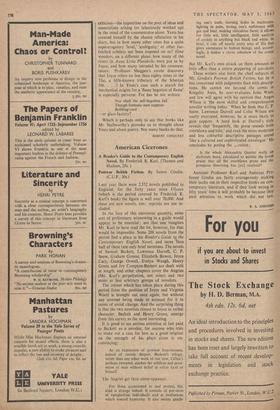American Cicerones
Postwar British Fiction. By James Gindin. (C.U.P., 30s.)
LAST year there were 2,352 novels published in England; for the forty years since Ulysses (which is the period covered by Frederick R. Karl's book) the figure is well over 70,000. And these arc new novels, too : reprints are not in- cluded.
In the face of this enormous quantity, some sort of preliminary winnowing in a guide would appear to be essential: not that one imagines Mr. Karl to have read the lot, however, for that would be impossible. Some 200 novels from the period find a place in his Reader's Guide to the Contemporary English Novel, and more than half of these rate only brief mentions. The novels of Samuel Beckett, Lawrence Durrell, C. P. Snow, Graham Greene, Elizabeth Bowen, Joyce Cary, George Orwell, Evelyn Waugh, Henry Green and Ivy Compton-Burnett are dealt with at length, and other chapters cover the Angries (Mr. Karl's perpetration, not mine) and two more or less arbitrary groups of novelists.
The retreat which has taken place during this period from the position of Joyce and Virginia Woolf is brought out once again, but without any attempt being made to account for it in terms of social change. And the surprising thing is that the two novelists closest to Joyce in verbal character, Beckett and Henry Green, emerge from this survey as the most interesting.
It is good to see serious attention at last paid to Beckett as a novelist, for anyone who tries to make out a case for him as a great original on the strength of his plays alone is un- convincing: As an expression of postwar hopelessness, indeed of cosmic despair, Beckett's trilogy, better than any other work of our time, Cdlinc's perhaps excepted, catches the nihilism and pessi- mism of man without belief in either God or himself.
The Angries get their come-uppance:
For those accustomed to real protest, this kind is strange indeed. It consists of pot-shots at vainglorious individuals and at institutions which reward hypocrisy. It also means gnash- nash- ing one's teeth, burning holes in mattresses, fighting in pubs, testing one's endurance with gin and beer, making ridiculous faces; it allows for little wit, little intelligence, little analysis of society in anything but black and white. In brief, it cuts off nearly every area of life that gives sustenance to human beings, and, accord- ingly, it makes a circus sideshow of the comic novel.
But Mr. Karl's own attack on them amounts to little nitre than a return peppering of pot-shots. These writers also form the chief subjects of Mr. Gindin's Postwar British Fiction, but he Is less concerned with judgments than with descrip- tions. He cannot see beyond the comic in Kingsley Amis, he over-evaluates John Wain, and few will agree with his opinion that Angus Wilson is 'the most skilful and comprehensive novelist writing today.' When he finds that C. P. Snow, Lawrence Durrell and •Colin Wilson are vastly overrated, however, he is more likely to gain support. A hard look at Durrell's style reveals that 'frequently, the prose sounds both overblown and trite,' and even the more moderate and less colourful descriptive passages sound `like a cultured and sophisticated travelogue.' He concludes by posing the ,,..iestion : Is the whole Alexandria Quartet really an elaborate hoax, calculated to satirise the lavish praise that all the overblown prose and the pompous theorising has [sic] received?
Assistant Professor Karl and Assistant Pro- fessor Gindin are fairly courageously sticking their necks out in their respective books on con- temporary literature, and if they look wrong in fifty years' time it will probably be because they paid attention to work which did not last.
B. S. JOHNSON






































 Previous page
Previous page